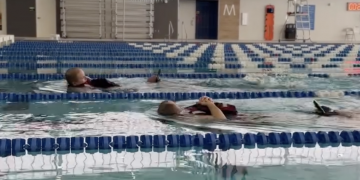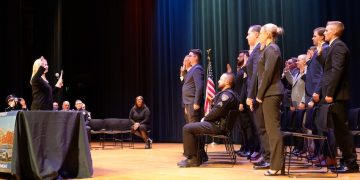In the lead-up to opening day, Caleb Baragar received that not-so-unexpected text from his pitching coach, Andrew Bailey, inviting him to the manager’s office.
Two weeks into his stint with the San Fransisco Giants, the lefty expected nothing more than a standard exit interview. Gabe Kapler, the boss, would tell Baragar what he’d done well and what he needed to improve on. Then it was out the door, and probably out of the Giants’ clubhouse. He was a 26-year-old minor-league starter whose only shot at sticking with the big club was in the bullpen.
That’s just the business. The Indiana alum knows it’s tough. A ninth-round draft pick in 2016, Baragar has served under four pitching coordinators in San Fran. One of those convinced Baragar he could induce more ground balls if he pitched side-arm, and after frustrating seasons in 2017 and ’18, Baragar wondered if he wouldn’t be better off going back to school and becoming a doctor.
But he didn’t. Somehow, the winding road led to a surprise invite to Giants’ summer camp this July. And there he was, sitting in Kapler’s office, ready to accept his fate.
“I just want to let you know … you opened a lot of eyes here,” Baragar remembers Kapler saying. “We think we can really benefit from having you.
“And you’ve made the opening day roster.”
If the country wasn’t in the middle of a pandemic, Baragar would have hopped out of his chair and hugged Kapler. He settled for an elbow bump instead.
Baragar was rather glad to be wearing a mask, concealing his true feelings.
“I know my mouth was jaw-to-the-floor, shocked,” Baragar said. “I never thought I’d be a reliever for two weeks and then all of a sudden you’re in The Big Leagues.”
***
Truth be told, signs were pointing toward an MLB breakthrough in the days leading up to that meeting. After one scrimmage, Kapler told media in San Fransisco that Baragar’s three-quarters delivery reminded him of Andy Pettitte. That compliment was screenshotted and texted to Baragar’s phone about 10 times.
He’s a major leaguer now, but it’s been quite the climb for the former Hoosier, who is, by definition, a late-bloomer. The highest honor Baragar achieved at Jenison High (Mich.) was honorable mention all-conference. He stood 6-1, about 170 pounds when he arrived at Jackson Community College for the 2013 season, unaware he had pro potential.
It was the ace of his first college team, Blake Higgins, who told Baragar the majors weren’t out of his lefty reach.
“He was our best player, by far. It wasn’t close. He threw 95. Every team was looking at him,” Baragar said of Higgins, who was drafted by the Cardinals in 2013. “For him to say something like that, I should listen to this guy. He knows what he’s talking about.”
Higgins told Baragar to hit the gym. He just had to get stronger, and take his work more seriously.
Baragar grew into his body, then suited up for IU as a junior and senior. There, he found another taskmaster in pitching coach Kyle Bunn, who once kicked Baragar out of a bullpen session due to a lack of command.
Changeup No. 1, over the catcher’s head.
“That’s terrible,” Bunn said.
Changeup No. 2, high again.
“If you throw another one like that, get out the bullpen.
“I laughed it off,” Baragar said. “Lo and behold, threw another changeup that missed the catcher. ‘Get out. I’m not going to sit here and waste my time.’
“He held me accountable. Now I hold myself accountable, better than anyone else holds me accountable. And that’s the way it should be.”
As a junior at IU, Baragar posted a 3.47 earned run average and 50 strikeouts. The next year, his ERA reduced to 2.49, and his strikeouts increased to 74. He was a hard-throwing lefty, quite the commodity for a pro team.
But it wasn’t an easy ascent with San Fran. In 2017, the year of Baragar’s side-arm experiment in Augusta, Ga. — the club’s hot, humid Single-A affiliate — his ERA ballooned to 4.63. The next year, Baragar went back to a three-quarters delivery, but he was an “errand boy” for the organization, bouncing between levels and posting a 4.06.
“A couple of weeks after the season was over, I was like, ‘Do I really want to do this?’” Baragar said. “I want to be a doctor. I could make a pretty good living being a doctor. If this isn’t worth my time, why even bother doing it?”
Baragar laughs it off now.
“I’m glad I stuck with it.”
***
With the dedication he learned from Higgins, and the mental toughness Bunn instilled, Baragar rode out the lows. He trained as hard as ever going into 2019, back on track with a 3.57 ERA split between High-A, Double-A, and Triple-A.
A week before the Giants were set to restart camp for 2020, Baragar was in Arizona, packing his bags for San Fran, just in case. He just as much expected to be packing for Michigan, because if he didn’t get the call to summer camp, he was headed home to visit family.
Nearly the entire week went by, living out of a packed bag, holding off on a Michigan departure.
On July 5, the call came.
“I’m ready to go if you guys ever need me,” Baragar told the Giants’ director of player development, Kyle Haines.
“Well, we need you,” Haines said.
Once a frustrated minor-leaguer, Baragar suddenly had an MLB shot. He was walking through the gates into Oracle Park, with McCovey Cove in right field. These are sights Baragar had only seen digitally, playing video games with his brother, Noah, but now they were real.
Baragar recalls the shot of adrenaline he felt as he took the mound for one exhibition, staring down A’s power hitters Matt Chapman, Matt Olson, and Khris Davis.
“My heart was pounding,” Baragar said. “I got lost in ‘This is the first time I’m throwing against a big-name guy’ rather than just pitching my game.”
Chapman walked. Olson tagged a hanging curveball. With runners on second and third, Davis hit a sac fly.
Giants outfielder Alex Dickerson, a fellow Hoosier alum, was there to pick Baragar up.
“I know you struggled a bit, but those guys were uncomfortable in the box,” Dickerson told him. “That’s a testament to your abilities. Don’t take today as a bad day.”
Baragar didn’t get down. It was just a lesson learned, and it wouldn’t be long before Baragar put it to good use.
After that surreal meeting in Kapler’s office, Baragar’s first MLB appearance was just as unreal. He entered in the fifth inning, one runner on, Dodgers all-star first baseman Max Muncy at the plate. Behind him, all-star Mookie Betts. Then all-stars Cody Bellinger, Justin Turner, and Cory Seager.
Baragar wouldn’t let adrenaline steal his control.
“I felt like I was really able to take the human element out of the game,” Baragar said. “The way I did that was through knowing how bad it could go if I didn’t.”
In his debut, Baragar retired five former all-stars. In order.
Muncy flew out. Betts grounded into a double play. The next inning, pop-out, strikeout, line-out.
Out-out-out, and Baragar was credited with his first MLB win. As a reliever.
“It was really good for my confidence,” Baragar said. “It let me know I can pitch here. It’s not just a fluke. There’s a reason (the Giants) believe in me, and I need to believe in myself as heavily as they believe in me.”
Baragar’s second outing was more of a reality check.
Again, he entered in the fifth frame with a runner on. Baragar struck out San Diego’s Manny Machado — another all-star — to leave the fifth unscathed. But in the sixth, Tommy Pham took an 0-2 fastball to left. Jurickson Profar smacked a first-pitch fastball out of the park.
The very next pitch, another fastball, was launched into right field by Wil Myers.
The obvious was confirmed: MLB hitters are good.
“I gave up three absolute missiles in a row. That’s never happened to me before,” Baragar said. “Let’s take a second to figure out what’s going on. They are ambushing my fastball. Stop throwing so many strikes.”
Lesson learned.
Baragar adjusted, throwing more off-speed pitches to induce two groundouts and a strikeout. Back in the dugout, Kapler offered encouragement.
“Kap commended me on how well I recovered and didn’t get scared,” Baragar said. “It is what it is. I was still going to pitch my game. I can’t take the home run back. I can limit the damage going forward.”
Just the life of a pitcher.
A major league pitcher, in his case.
“Right now, I’m just trying to learn my role and learn how to pitch up here,” Baragar said. “Up here, everyone is good. They’d be the best player on their team in the minor leagues. (Thursday) night was a really good learning experience. You can’t fall into patterns.
“I want to be successful. I’m going to compete every day. I’m going to learn as much as I can every day.”

















































































